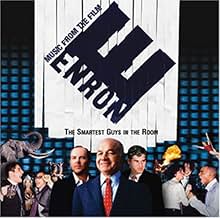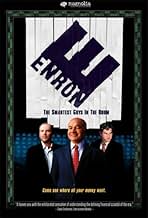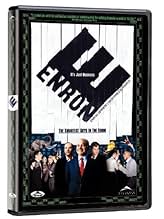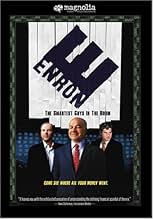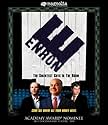Enron: The Smartest Guys in the Room
- Episode aired Oct 13, 2005
- R
- 1h 49m
Corporate audio and videotapes tell the inside story of the scandal involving one company's manipulation of California's energy supply and its, and how its executives wrung a billion dollars... Read allCorporate audio and videotapes tell the inside story of the scandal involving one company's manipulation of California's energy supply and its, and how its executives wrung a billion dollars out of the resulting crisis.Corporate audio and videotapes tell the inside story of the scandal involving one company's manipulation of California's energy supply and its, and how its executives wrung a billion dollars out of the resulting crisis.
- Director
- Writers
- Stars
- Self
- (archive footage)
- Self
- (as Jim Chanos)
- Self
- (archive footage)
- Self - Young man the stripper dances in front of
- (as Reggie Deets II)
- Director
- Writers
- All cast & crew
- Production, box office & more at IMDbPro
Featured reviews
'Twas hubris killed the beast
The Enron scandal was a tough one to understand, at least to me it was, because you could never quite figure out what Enron did. And director Alex Gibney breaks it all down matter-of-factly, never taking sides, never being judgmental, to show us what happened. Of course, he really doesn't need to be judgmental because the actions of Lay, Skilling and Fastow (and a few others) speak volumes.
Gibney's film very well could have been a convoluted mess. But he never loses sight of the fact that this is essentially a story about people. Not only the masters of the universe whose hubris eventually brought them down but, more importantly, the people whose livelihoods depended on what Lay, Fastow and Skilling did and who, unlike those three, didn't have millions to fall back on.
It's impossible not to feel incensed by what they did. Lay, Fastow and Skilling destroyed countless lives, yet they left with millions. There's a moment when Lay bemoans that his net worth dipped from $20 million to, I believe, $6 million. Yeah, tell that to the Oregonian utility worker, whose $340,000 nest egg was eventually only worth $1,200 after Enron stock tumbled in the wake of the scandal.
What's ultimately devastating about this film is listening to the tapes of Enron traders joking about how they were holding California hostage and letting people there suffer without electricity. These chaps are cold, callous and exemplify the Enron environment.
This is a fascinating film because it exposes these guys for who they are. And after listening to those interviewed in this film, it's impossible to believe Lay and Skilling were somehow oblivious to it all. How else could you explain why they insisted Enron employees invest in the company stock while they themselves were cashing out?
What's equally infuriating is realizing how Wall Street sucked up to Enron and how investment firms turned on anyone who dared to question Enron's power.
Of course, it's not surprising at all to see Lay's connections to the Bush family. But I am certain Dubya really didn't know very well someone he called "Kenny Boy." Just as, I'm sure, W's photos with Jack Abramoff mean absolutely nothing, either.
There's a moment in "Wall Street" when Bud Fox asks Gordon, "How much is enough?" And Gordon replies, "It's not a question of enough, pal. It's a zero sum game, somebody wins, somebody loses. Money itself isn't lost or made, it's simply transferred from one perception to another."
That's exactly what Enron did under Lay and Skilling. Except they did it on the backs of tens of thousands of hard-working Americans who lost pretty much everything. I can only hope the American justice system does right by all those workers.
An Entertaining Introduction to A Business Scandal that Affects Everyone
While the film leaves out some of the technicalities, it does an entertaining job of combining talking heads, lively graphics, news clips, incendiary dramatizations (such as of busy, noisy shredders), company documents and whistleblower-obtained stunningly damning audiotapes, web broadcasts and video tapes to document how a major company could grow out of smoke and mirrors to become the largest bankruptcy of its time, bringing down countless victims with it.
Establishing an arresting time line that serves like a ticking clock, the film is excellent at visually demonstrating how other corporations, particularly lenders and brokerages, profited from not revealing the truth.
The filmmakers particularly gleefully accent the company's political connections, going beyond the popular "Kenny Boy" friendship of CEO Ken Lay with George W. to extend to the Bush clan and inner circle, including the Federal Reserve's Greenspan, to hone in on how it fomented self-serving deregulatory policies, with a special emphasis on California and its frighteningly manipulated energy, and resulting political, crisis.
The filmmakers do make some of the talking heads seem objective when they actually have their own profitable axes to grind, such as shareholder attorney William Lerarch, and let the Johnny-come-lately legislators look a little too good as they puff up at the Congressional hearings.
A bit too much is made of the executives as former nerds, as these guys weren't computer geeks; rather there were class issues at work that are hinted at in the brief biographies in the culture of traders who were entrepreneurally lifting their incomes by gambling. At the same time, whistleblower Sherron Watkins's actions and motivations are not emphasized as particularly heroic in going against the company's macho culture (the many Deep Throats cited in the credits as anonymous sources are amusing).
A delightful range of popular music is also used to emphasize points, from Tom Waits to "God Bless the Child," as well as popular culture references from "The Simpsons" to "Gordon Gekko"'s defining quote also keep the film from just being like a dry episode of PBS's "Frontline". I presume the title itself is meant to recall the classic laying bare of the men who got the U.S. mired in the Viet Nam War, Halberstam's "The Best and The Brightest." The film does slight the clear-eyed folks who were warning about the declining ethics in the accounting profession and the lack of fundamentals in the bubble investments as Enron and its ilk were on the way up -- and who were vilified in the business community for their Cassandra pronouncements.
The film does make the Enron situation seem too unique. While personalizing the stories around the head people at the company --especially as they transformed from geeks to power brokers --makes the story easier to follow in a movie, it makes this corporate culture unusual. It also lets off the management consultants, let alone the business schools' emphasis on stock price analysis, who were cheerleaders for these techniques; McKinsey and Harvard spawned at least one of the colorful figures profiled here.
This kind of egotistical "I'm top of the world, Ma" attitude in business was also typical of the Rigas at Adelphia in Pennsylvania, Ebbers at WorldCom in Mississippi, and Scrushy at HealthSouth in Birmingham, Alabama, and the just dethroned Greenberg at AIG scandal in the heart of Wall Street, shows that enough chutzpah and money can deflect anyone, anywhere, using the same techniques -- a ruthless, macho corporate culture that forces out anyone who disagrees, browbeating regulators, hiding secret accounts and spreading around manipulative corporate philanthropy.
At a NY Financial Writers' Association panel as the Enron story was breaking, they did an introspection that unfortunately is not provided by the film, on why they didn't report earlier that the emperor had no clothes (as one of the sub-chapters in the film puts it). The consensus was that the journalists realized they mistrusted the motives of the warners more than they doubted the motives of the corporate executives who were issuing the bravado reports and deflecting timid questions, even though the journalists too late realized that the executives had way more to gain than the Chicken Littles and they were intimidated by their own lack of accounting expertise to recognize the sliding slope of accounting ethics (though the film does very briefly touch on how the CPAs early on accommodated the bubble by too easily officially approving the now notorious "mark to marketing" accounting procedure that permitted the booking of goods not yet obtained, though there's no mention of casually lax acceptance of external auditing firms to simultaneously do internal auditing and profitable consulting).
McLean, a co-writer of the film whose book is the premise for most of the film, did supplement the film in an interview on Charlie Rose that should be included on the DVD by naming the "shorter" (an investor who gains if prices go down) who first had tipped her off, though she didn't there mention the local Houston business reporter she cited at the panel who was the very first one to report suspicion of Enron's numbers. She also clarified on the show that while her article in Business Week is now seen as the beginning of Enron's end, her actual findings were very mildly stated, particularly compared to the full truth as it came out, and only aroused suspicions by the ferocity of the company's denials.
Even as the film concludes with an it could happen again warning, with no analysis if Sarbanes-Oxley will help, it places too much emphasis on the uniqueness of Enron.
In the dictionary next to "hubris"....
Yes, it is a movie with a point of view, but this is not a Michael Moore documentary. Director Alex Gibney brilliantly tells the story simply by interviewing people who were participants in the events, showing the time lines of those events, and interweaving an astonishing amount of video and audio footage taped at Enron, by Enron itself. The movie resolved for me the question: "What did they know, and when did they know it?" They knew. They not only knew; they designed the company to be the ultimate shell game, with no pea. The only thing Enron ever had to sell was its stock price. And they did know that was their only product.
As a Houstonian, I admit that I, a supposedly sophisticated business professional, was intimidated by Enron's assertion in its glory days that the reason I didn't understand its business was just that I wasn't smart enough. My friends, managers and lawyers, some from Harvard thenselves, also admit to the same intimidation. It was not that the questions were not being asked; it was just that we were silenced when Enron avowed that they were the smartest guys in the room. They asserted it, and we believed them. Thank good Fortune that one reporter, Bethany McLean, in almost too soft a voice to be credible as a giant killer, kept asking.
I wish this movie might inspire a larger remedy than the one being attempted by the Department of Justice. Why doesn't Harvard deny admission to people like Jeff Skilling, who, when questioned in his entrance interview whether he was smart, replied, "I'm (expletive deleted) smart"? Why isn't some humility and modesty still ranked a virtue? Why do we celebrate the rise of the specialist educated only in his field, and wholly ignorant of the inevitability of the fall of the Greek protagonist who becomes blinded by arrogance, power, greed---- in short, hubris? Why is ethics a specialty study, instead of integral to every field of study? I sat open-mouthed as the tape showed Jeff Skilling seriously selling a new business idea: selling futures in the weather. He parodied himself on tape: he had a new, better idea than the "mark to market" booking which allowed Enron to book future theoretical profits once they had signed a deal; now he would institute "hypothetical to book", booking profits as soon as he had an idea. What, ultimately, was the difference between the parody and the reality? The horror of listening to traders, who sat in a room directly below Ken Lay and Jeff Skilling, with staircases between their executive offices and the trading floor, laughing at the misery they were inflicting on California as they extorted profits from that misery, leaves me outraged long after the movie is over. They threatened and may have cost lives with their fraudulent tactics. They admit it on tape, laughing. They knew. It was their business plan. To make Andrew Fastow the scapegoat for what Enron was developing as its business plan before he was ever hired is simply the continuation of the shell game with no pea. Look for the "designated fall guy". They still think they are the smartest guys in the room.
No, I'll never be selected for the jury pool now, but I wouldn't have been anyway. I'll buy the DVD and watch it a few times during the trials and seethe, lest I forget. Excellent movie, the best kind of documentary.
Wow - gotta see it again to believe it!
Boys gone amok
In the eighties we called people like the Enron Executives "Masters of the Universe." Now we can call at as we see it, Over grown former nerds with no morality and no conscience.
.
Did you know
- TriviaAmong the protesters who disrupt the meeting with Jeff Skilling at San Francisco's Commonwealth Club is Marla Ruzicka, who was killed on 16 April 2005 in Iraq by a suicide bomber. She founded CIVIC (Campaign for Innocent Victims of Conflict) which worked to help the victims of the war in Iraq and she was a former Global Exchange activist.
- Quotes
Gray Davis: [upon being asked whether the rumors that he was responsible for the black outs in California are just a plot by the Republican party to get him recalled]
[shouts]
Gray Davis: Hello!
- Crazy creditsSpecial thanks includes "all the `Deep Throats' - you know who you are!"
- ConnectionsFeatured in 2006 Independent Spirit Awards (2006)
Details
- Runtime
- 1h 49m(109 min)
- Color
- Sound mix
- Aspect ratio
- 1.85 : 1


